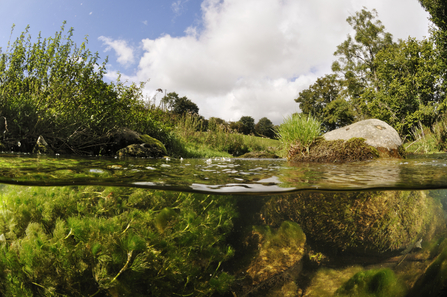
Toad habitat © Linda Pitkin/2020VISION

Toad habitat © Linda Pitkin/2020VISION
This Environment Bill is our opportunity to tackle the environmental emergency and it should be the highest priority for all political partiesStephen Trotter, CEOCumbria Wildlife Trust
The Bill’s second reading is due on Monday 28 October 2019. We hope that it attracts cross-party support and a long-term political commitment to achieve nature’s recovery in Cumbria over the next 25 years.
The recent State of Nature Report revealed that one in seven species in the UK is at risk of extinction and that 58% of species are in decline. We live in a nature-depleted country and even in a county like Cumbria, the natural environment is far from what it should and could be.
We have long-called for ambitious new laws to drive the recovery of wildlife and wild places. So we’re very pleased to see that the Government has recognised the scale of the challenge by including legally binding targets and measures to create a Nature Recovery Network in the Bill. A joined-up physical network of habitats is vital to provide enough space for wildlife to recover and move in response to climate change.
Stephen Trotter, Chief Executive of Cumbria Wildlife Trusts, says:
“I’m really pleased to see the Government’s commitment to creating a Nature Recovery Network right across Cumbria from the Irish Sea to the Pennine Watershed – and from Arnside and Kirkby Lonsdale to the Scottish Border. It’s good to see this will include a statement of biodiversity priorities for Cumbria and mapping to indicate where and how we all need to take action.“
“The need to put nature into recovery is more urgent than ever. Wildlife and the wild places on which it relies are in trouble – on both land and at sea. The general public and young people in particular are crying out for effective action. This Environment Bill is our opportunity to tackle the environmental emergency and it should be the highest priority for all political parties.”
“We need to work together to make this happen. It’s critical that the new Act brings together those with the power and ability to take action to transform Cumbria’s natural environment. We can all make a contribution – but this especially needs to include the local planning authorities, National Parks and AONBs, official Government agencies, Local Enterprise Partnership, environmental charities, farmers, landowners, businesses and individuals.”
“We welcome the new requirement for all public bodies to have regard to conservation and enhancement of biodiversity although this needs to be an active duty to restore nature at every opportunity.”
Stephen added: “Another key element is for Government to unlock and provide more funding and resources so that people in Cumbria can scale-up the urgent action that is required. A recent report showed that at least £2.4Bn across England is required annually if we’re to put wildlife back into our landscapes.”
“The Bill as proposed has lots of strong proposals, but it could still be improved. I am particularly disappointed that major infrastructure projects like the dualling of the A66, Carlisle Southern Bypass and future developments like new energy generation developments might not be subject to the principle of ‘net gain’. This means that the new legal requirement to make developers actively improve nature will not necessarily apply to the most damaging schemes.”
We have written to each MP in Cumbria asking them to support the Environment Bill and seek some key amendments on Monday 28 October. We need to ensure as many MPs as possible speak up for the environment at this crucial time. Make a difference by asking your MP to attend. There is a letter template below or alternatively just fill in this simple form.
We now live in one of the most nature depleted places on the planet. Nature urgently needs our help to recover – and it can be done.Sir David Attenborough, President EmeritusThe Wildlife Trusts
In a short film for The Wildlife Trusts, calling for powerful new environmental laws and for a Nature Recovery Network, Sir David Attenborough, president emeritus of The Wildlife Trusts, said:
“A wildlife-rich natural world is vital for our wellbeing and survival. We need wild places to thrive. Yet many of our systems and laws have failed the natural world. We now live in one of the most nature depleted places on the planet. Nature urgently needs our help to recover – and it can be done. By joining up wild places and creating more across the UK we would improve our lives and help nature to flourish - because everything works better when it’s connected.”
Why a Nature Recovery Network?
For many years we’ve known that nature reserves alone are not enough for wildlife’s recovery. Too often we’ve seen wildlife forced into fewer and smaller pockets of wild space, surrounded by urban development or intensive agriculture. This reduces nature’s resilience to climate change. Sir John Lawton, who led a Government review of England’s wildlife sites in 2010, said: “There is compelling evidence that they are generally too small and too isolated. We need more space for nature.”
To allow nature to recover, we need to reconnect the fragmented sites that remain – stitching back together Britain’s tattered natural fabric of wild land and creating more space for wildlife.
A Nature Recovery Network would act as a strategic spatial planning framework to map, plan and deliver what nature needs to recover, allowing targeted delivery and investment in nature’s recovery and for translating national objectives into real change on the ground. Aligning funds such as Environmental Land Management payments and “net gain” contributions will provide value for money and allow businesses to have confidence in where and how to invest for long term environmental gain.